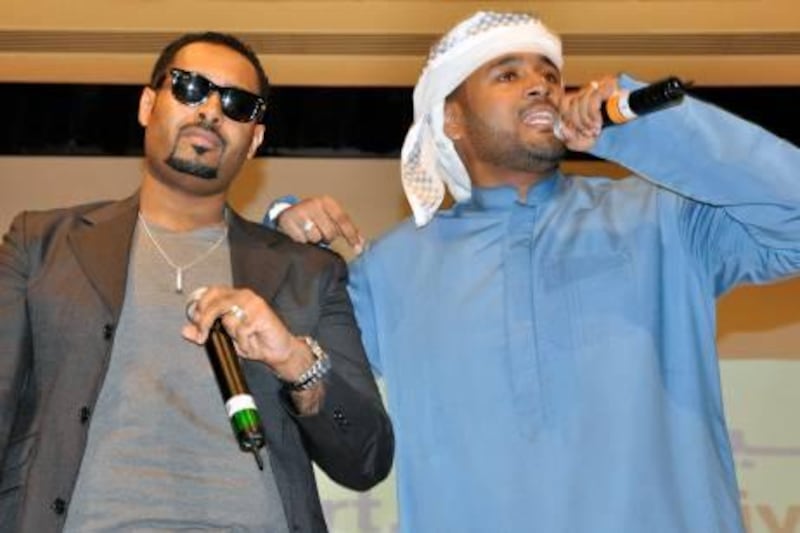DUBAI // More than 600 students at a women's college were horrified, sickened then thoroughly entertained during a day-long seat-belt safety campaign.
The Emirati hip-hop duo Desert Heat and the Bahraini R&B artist Tiny provided the entertainment at Dubai Women's College as part of the BMW Group Middle East's road safety campaign.
The message for the campaign was included in a song by Desert Heat, also known as the brothers Abdullah and Salim Dahman.
"Stay alert, stay alive," they rapped to the audience, who cheered, clapped and shot footage of the performance with their mobile phones.
"No mobiles while driving, no need for multi-tasking. Your life is not a movie, no need for all the action. You might think you're Hamilton but you can't control traffic, that's why they're called accidents - you don't plan it but they just happen."
Abdullah, whose rap name is "Arab Leak", and Salim, or "Illmiyah", said they wrote the song after the deaths of several friends and relatives in car crashes.
"We were inspired by the needless death of young men and women and soccer players such as Theyab Awana, and others," Abdullah said.
"The lyrics were written before the campaign and the message is, wear your seat belt, don't speed and don't use your mobile. We've lost a few friends and members of our family."
Salim said many Emirati youth considered seat belts unnecessary, but car crashes were the leading cause of death for those aged between 15 and 29.
"We want to change the stereotype perception that wearing seat belts is uncool," he said. "We hope to bring this message through our lyrics and tell people that it's cool to wear your seat belt."
But the day did not begin on such an upbeat note.
Lt Hamdan Ahmad Al Muhairi of Dubai Police gave a lecture in which he said only 29 per cent of drivers in the UAE wore seat belts and road accidents in the UAE were responsible for nearly 70 per cent of injury-related deaths among Emirati youth.
Lt Al Muhairi added 55 per cent of students in the UAE did not wear their seat belts.
To illustrate how wearing a seat belt could increase the chances of survival by between 40 and 50 per cent, he showed a gruesome video of a person being thrown from an SUV as it rolled end over end.
The occupant was thrown several metres into the air and landed in oncoming traffic, where he was struck by another SUV.
The video was met with gasps and screams from the audience.
When the officer asked for a show of hands from those who always wore their seat belts, only a few were raised. One student said she didn't wear her seat belt because it wrinkled her clothes.
Another said she didn't wear it because it obstructed her view as she looked over her left shoulder, and a third said she didn't wear it because she was pregnant and was worried that in an accident, it would injure her child.
Lt Al Muhairi appeared surprised by some of the answers and said he would station a patrol car in front of the college campus to monitor students as they drove away.
Mahra Khalifa, 27, said she would change her behaviour.
"The statistics the police presented and the video were frightening," Ms Khalifa said. "I will always wear my seat belt."
All those attending were asked to sign a pledge that they would always wear seat belts.
Everyone signed.






